Seven Scholars Join Georgetown Law Faculty
August 26, 2024
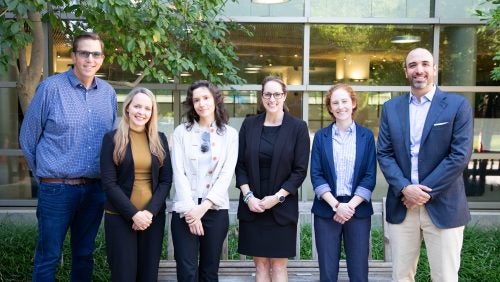
New members of the Georgetown Law faculty gathered recently for an orientation session. L-R: Prof. Stephen Vladeck, Prof. Stephanie Barclay, Prof. Emily Chertoff, Prof. Sara Colangelo, Prof. Sarah Sloan, Prof. Filippo Lancieri. Not present: Prof. Eduardo Ferrer.
As a new academic year begins, we are pleased to introduce seven new members of the Georgetown Law faculty: two joining us as full professors, three in earlier stages of their teaching careers and two who are already well known on campus, but have now officially joined the tenure track faculty.
“It is always a joy to welcome new colleagues, and I am especially proud of our incoming faculty this year,” said Dean William M. Treanor. “They bring expertise in areas of law today’s students are vitally interested in – national security, constitutional law, antitrust, environment, and so much more. I look forward to working with them all.”
Stephanie Barclay, Professor of Law
Constitutional law scholar Stephanie Barclay decided to become a lawyer at age 10, when she traveled to San Francisco with her father, whose company faced a lawsuit that had reached the U.S. Court of Appeals for the Ninth Circuit. Sitting in the courtroom, Barclay was captivated by the lawyer arguing the case. “What he was doing looked like a lot of fun,” she says. “I also had a sense of how much power for good this attorney had for our family.”
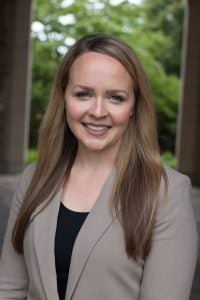
Prof. Stephanie Barclay
Years later, having completed undergraduate studies at Brigham Young University–Idaho and earned a J.D. from BYU Law, Barclay found herself in the same Ninth Circuit building. This time, she was a new attorney advocating on behalf of a prisoner in a religious liberty case, and her father came to watch her first-ever oral argument. “Afterwards, my dad and I sat next to each other on the bench where we had been more than a decade prior,” she recalls. “Taking that case turned out to be a pivotal decision. I realized just how much the principle of religious liberty meant to me — not just for that client, but more generally.”
Although always interested in constitutional issues, Barclay notes that her path to legal academia was non-traditional. She originally pursued First Amendment and religious liberty work as a supplement to her caseload at the Washington, D.C. firm Covington before litigating First Amendment cases full-time at the Becket Fund for Religious Liberty, where she represented clients at both the trial and appellate level, including before the U.S. Supreme Court. She has also clerked for Judge N. Randy Smith of the Ninth Circuit Court of Appeals and Justice Neil Gorsuch of the U.S. Supreme Court.
Prior to joining Georgetown Law, Barclay was an associate professor of law at BYU Law and most recently served as faculty director of the Religious Liberty Initiative at the University of Notre Dame Law School. Barclay joins the Law Center as faculty co-director of the Georgetown Center for the Constitution alongside Professor Randy Barnett, where one of her first projects is the launch of a new fellowship that will offer mentorship and support for emerging scholars.
Above all, Barclay looks forward to helping foster an inclusive community where all law students feel welcome — and learn to put their legal training to practical use. “Georgetown Law is a community of people who are thinking about important, deep theoretical ideas and then thinking about the next step, which is: How do we leverage those ideas to have an impact on the lives of real people and real policy out in the world?” she says. “I’m excited to be a part of that.”
Stephen Vladeck, Professor of Law
“I’m that rare breed who looks back on law school with pangs of jealousy and nostalgia,” says Stephen Vladeck of his years at Yale Law School. “Law school was just a nonstop feast.” Not only did he find his life’s calling, legal education, as a teaching assistant in a civil procedure class, he also got to be part of one of the post-9/11 era’s knottiest legal conundrums: figuring out how to provide suspected terrorists with meaningful access to the courts.
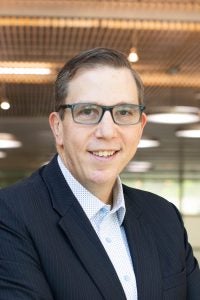
Prof. Stephen Vladeck
At the time, Neal Katyal, a Georgetown Law faculty member and Yale Law alumnus, was working on what would become Hamdan v. Rumsfeld, a 2006 Supreme Court case that found that the George W. Bush administration’s military commissions for trying Guantanamo Bay detainees violated both federal law and the Geneva Conventions. Katyal reached out to professors and students from both law schools to help him investigate the novel and high-stakes questions involved. “It was an unusual opportunity to be on the ground of a field that was inventing itself,” recalls Vladeck. “We were coming up with arguments based on 19th century cases and academic arguments in textbooks that had never really been tested. It was fun – and kind of crazy.”
Over the past two decades, Vladeck has enthusiastically dived into multiple forms of new media, from blogging (he was an early contributor to PrawfsBlawg, one of the first legal academic opinion sites), to social media (he’s a prolific poster on X and other platforms) to podcasting (he co-hosts The National Security Law Podcast), to punditry (he’s a legal analyst for CNN) to Substacking (he authors a weekly e-newsletter, “One First,” about the Supreme Court).
“I’ve always been interested in how the academic and real worlds inform each other, how real-world disputes both spark and react to academic work, and vice versa,” he says. An example of how he’s translated a piece of legal scholarship for a popular audience is his bestselling 2023 book, “The Shadow Docket: How the Supreme Court Uses Stealth Rulings to Amass Power and Undermine the Republic.” His examination of the Court’s increasingly frequent reliance on its authority to issue emergency rulings outside the usual system for arguing cases grew out of a series of Tweets. His Twitter commentary on how Donald Trump’s Solicitor General was interacting with the Court led to a 2019 Harvard Law Review article where he analyzed the issue from an academic perspective. “As I was working on the Harvard piece, I realized that there was so much more to say, and to such a different audience,” he says. “It’s been really fun to bounce back and forth between the two worlds and try to take the best from each.”
Vladeck joins the Georgetown Law faculty from the University of Texas School of Law, and previously taught at the University of Miami School of Law and American University Washington College of Law. Being practically in the same neighborhood as the Supreme Court and U.S. Capitol, with endless hearings and arguments just a short walk away, is tempting, he admits. “An embarrassment of riches. All the reasons why Georgetown is amazing also makes it a little dangerous,” he says.
At the same time, he’s also excited to settle in and get to know his new campus home. He already has a close friend on the faculty: his uncle David Vladeck, a longtime professor and clinic leader. As it turns out, both Vladecks will be teaching first-year civil procedure courses this year – in the very same time slot. Hopefully, their students will double-check which classroom they’re meant to be in. “I have to figure out what kind of pranks we’re going to play,” he says.
Emily Chertoff, Associate Professor of Law
Even before she studied law, Emily Chertoff had an inkling that she wanted to pursue scholarship with real-world significance. “I felt really strongly that I wanted to be in a field where I could have an impact on people’s lives,” she says, recalling how, as a high schooler, she realized that academic research was often siloed from practice and policymaking — a pitfall she wanted to avoid as she entered legal practice and later, academia.
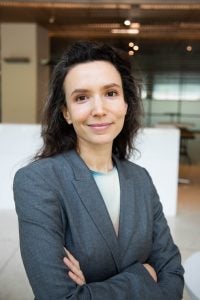
Prof. Emily Chertoff
After earning a B.A. from Harvard University and spending time as a journalist, Chertoff attended Yale Law School, where a class on immigration law captured her interest. “Immigration law seemed to obey a totally different set of norms and values than the rest of the legal system,” she recalls. “I’m fascinated by areas of the law where there’s tension between our ideals and norms and the reality of how things work.”
After law school, Chertoff joined the Immigrant Defenders Law Center in Los Angeles as a staff attorney, representing asylum seekers at one of the largest immigration detention facilities in the country. In that role she worked on impact litigation and appellate advocacy, including filing emergency COVID-19 habeas petitions for prisoners. As the first executive director of the New Jersey Consortium for Immigrant Children, she helped establish a state-funded legal service program for immigrant youth.
Witnessing how the letter of the law differed from the reality of the immigration system helped shape Chertoff’s scholarship, which focuses on the interplay between government institutions that use physical coercion and control, such as prisons and national security agencies, and the norms and regulations imposed by administrative law. She also remains engaged with substantive immigration law, and is researching how different societies have regulated migration — a topic that she is excited to explore with students in an upcoming seminar at Georgetown Law.
“As somebody who loved being a defense attorney and working with clients, I’m excited to share that with students,” says Chertoff, noting that she is particularly eager to pay forward the faculty support she received as a law student in her new role as professor. “Mentoring students who are thinking about how to turn their ideals into reality is going to be really exciting.”
Filippo Lancieri, Associate Professor of Law
Growing up in Brazil in a family of lawyers, Filippo Lancieri recalls that legal topics were a common subject of discussion at the dinner table. “Law was always part of my life,” he says, noting that Brazil’s system of public economic law helped spark his scholarly interest in the interplay between government and market forces.
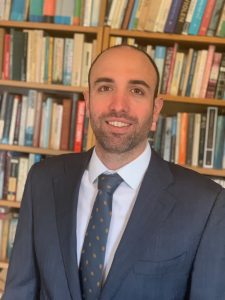
Prof. Filippo Lancieri
After earning a law degree and master’s in economics in Brazil, Lancieri continued his studies at the University of Chicago Law School, where he earned a Master of Laws degree and Doctor of Juridical Science degree. He worked as an antitrust and technology regulation lawyer in Sao Paulo and Brussels before becoming a law professor. In addition to his Georgetown appointment, he is also a fellow at the George J. Stigler Center for the Study of the Economy and the State at the University of Chicago Booth School of Business and an associate editor of the Journal of Competition Law and Economics.
Lancieri’s research focuses on both antitrust and regulatory policy and the governance of digital markets, and he notes that he was drawn to academia for the intellectual freedom it offers. “[In private practice], we would study in-depth, complex questions that are relevant to society — but the answers were restricted to our clients,” he says. “Academia provides the independence to think about important questions and the privilege of publishing your findings as common knowledge.”
Having relocated to Washington, D.C. from Switzerland, where he most recently served as a postdoctoral fellow at the ETH Zurich Center for Law & Economics, Lancieri says he is particularly excited to explore regulatory and antitrust issues in the nation’s capital, where the government agencies and regulatory bodies that shape economic law and policy are located just a short distance from the Law Center campus.
In addition to contributing to the work of Georgetown Law’s antitrust and law and technology departments, Lancieri is eager to connect with students — whom he calls “the next generation of civil servants” — in the classroom. “First and foremost, our impact as law professors is through the people that we train and help develop,” he says. “Georgetown Law is committed to the notion that we are training students who will go on to improve policy and improve society.”
Sarah Sloan, Associate Professor of Law, Legal Practice
First-year law students quickly realize they need to learn an entirely new, lawyerly way of communicating. Sarah Sloan, the newest member of Georgetown Law’s large teaching team dedicated to legal writing and research, brings experience from three judicial clerkships to the assignment. After earning a J.D. from Columbia Law School, she clerked for Judge Alison Nathan of the U.S. District Court for the Southern District of New York; for Judge Michelle Friedland of the U.S. Court of Appeals for the Ninth Circuit; and on the U.S. Supreme Court, where she worked with both Justice Elena Kagan and retired Justice John Paul Stevens.
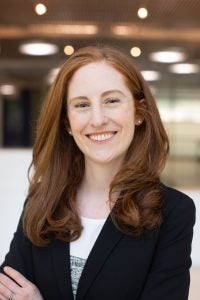
Prof. Sarah Sloan
“A clerkship is a wonderful way to see lots of different kinds of lawyering. You get a sense for different strategies in brief writing, different organizational structures, what’s persuasive to your judge, what might be persuasive to other judges. And then you watch your judge reason through the issues and craft an opinion,” she says. “What I want to teach my students is that there are lots of ways to write and to be effective. And my role is helping them find their voice and find what works for them.”
Sloan has also worked as a litigator, in the Supreme Court and Appellate Group at Orrick, Herrington & Sutcliffe LLP and at the Policing Project at NYU Law School. She appreciated building her legal reasoning skills in these roles, she says, but was drawn toward academia for the next stage of her career. Georgetown Law, she says, is a welcoming place to teach.
“The structure of the legal practice classes and the institutional support for them drew me to Georgetown,” she says. “In addition, the legal practice faculty are incredible colleagues.” Once she gets a bit more grounded into her teaching routine, she adds, she plans to spend some time on developing her own scholarship. “There are a couple of issues that have been tugging at me. There’s a sort of ‘nitty-gritty’ area of habeas law that I think I could write about,” she says.
While this will be Sloan’s first full-time position teaching law, she has other classroom experience: between college and law school, she taught algebra at a charter school in New Orleans. Some of the lessons she learned there are transferable, she says. “I’m excited to watch 1Ls learn how to think like a lawyer. Teaching freshmen was similar, in that I was introducing them to high school and to taking on more responsibility.
“There’s something really special about teaching at the introductory level, whatever it may be, and there’s a real privilege in helping students grow over that year.”
Sara Colangelo, L’07, Associate Professor of Law
Sara Colangelo says her first decision to come to Georgetown Law, when she was applying to law schools, was a “no-brainer.” She’d been passionate about protecting the environment ever since childhood, and eventually came to understand that while people affected the quality of the environment, the quality of someone’s environment affected their health and community well-being too. She knew Georgetown, located so near to Capitol Hill and federal agencies, would be a great place to begin a career in environmental law.
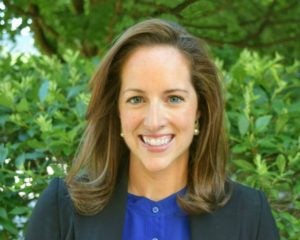
Prof. Sara Colangelo, L’07
One highlight was a clinic led by pioneering environmental lawyer Hope Babcock. She also studied with other faculty experts in environmental law and policy, worked on the Georgetown Environmental Law Review and explored various career paths through internships. All this led her to her “dream job,” joining the Department of Justice’s Environment and Natural Resources Division through the prestigious Attorney General’s Honors Program. “I was able to represent the United States, hold polluters accountable, and protect people – Clean Air Act cases, Clean Water Act cases and Superfund cleanups. And the opportunity to step into the courtroom very early on in my career was incredible,” she recalls.
But it turned out that Georgetown would call her back. Several years into her DOJ career, Colangelo caught up with Professor Babcock over coffee and mentioned that the Law Center ought to offer a course on environmental practice and advocacy. Babcock responded by suggesting that Colangelo teach the course herself as an adjunct professor. Colangelo already knew she loved teaching, from a post-college stint as a biology teacher, so she gave it a try… which led to her being hired as director of the Law Center’s Environmental Law & Policy Program in 2015, teaching several more courses (and winning a teaching award in 2020), and then three years ago, taking a visiting professorship to lead the clinic she’d been part of herself. This summer, she officially joined the full-time faculty.
Under Colangelo’s leadership, the clinic, now known as the Environmental Law and Justice Clinic, represents clients from communities that are overburdened by pollution and climate change and historically marginalized in environmental decision making, including Indigenous populations across the country and under-resourced neighborhoods just a few miles away from campus. “One focus of the Clinic is to help students understand that justice-oriented issues pervade an area of the law that can appear neutral, because it is science oriented. This is an especially rich area of the law to challenge students to examine that veil of neutrality and see how there can be equity issues,” she explains. The Clinic’s work also informs Colangelo’s research and scholarship on environmental law and related fields.
“I’m about 20 years from taking my first steps on the Georgetown campus, and still believe in the power of the law to do good things for people,” she says.
Eduardo Ferrer, B’02, L’05, Associate Professor of Law
Eduardo Ferrer thinks often about a boy he represented when he was a student in Georgetown Law’s Juvenile Justice Clinic (JJC). When it was time to say goodbye at the end of the semester, Ferrer took the 13-year-old to the National Mall for some sightseeing, and was surprised to learn he’d never been there before. Later, Ferrer asked the boy’s father why they hadn’t visited – after all, the museums and monuments are free.
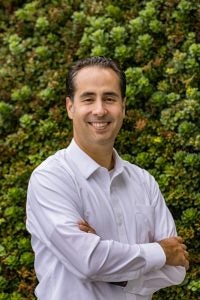
Prof. Eduardo Ferrer, B’02, L’05
“His dad said, ‘Those monuments weren’t built for us,’” Ferrer recalls. His own parents had immigrated from Cuba to California in the 1960s with very little, but a generation later they were an “American dream” success story, with their three children having become a doctor, a lawyer and a teacher. Ferrer resolved to help bridge the persistent divide that keeps so many poor Black and Latino youth from accessing the kind of opportunity he’d had to move ahead in life – and specifically, work to change a world that too quickly responds to adolescent misbehavior with law enforcement.
Like many JJC graduates, Ferrer stayed in the Clinic’s orbit after graduation. He joined a law firm, but on the side partnered with several Georgetown Law classmates to launch a nonprofit organization focused on juvenile justice policy in Washington, D.C., and eventually left the firm to help lead the organization. He was frequently in contact with JJC’s leaders, Professors Wally Mlyniec and Kristin Henning, asking for advice, collaborating on policy issues and helping out with the Clinic’s ongoing cases when school was out of session. Eventually, Henning and Mlyniec invited him to teach as a visiting professor, then brought him on full-time as policy director of the Clinic and its related Juvenile Justice Initiative, which offers trainings for lawyers and others throughout the juvenile legal system in the District and beyond. This summer, he was promoted to Associate Professor of Law, and is excited to continue the work he’s come to value.
“One of the joys of my job is how multifaceted it is,” Ferrer says. “I get to work directly with young people and families. I get to teach students. I get to continue to learn from Kris and Wally and I get to be embedded in the D.C. community and represent Georgetown. We work with tons of community-based organizations. We’re relied upon heavily by folks in government for advice on how to make things better. And so it really is just an incredible combination of all the things that I love to do.”
Another joy? The growing network of JJC alumni who, like himself, have become colleagues in the cause of youth justice reform. “I have former students representing other organizations in our coalitions. I go up to the D.C. Council building and see former students who are now staff. I see JJC alumni doing incredible pro bono work and serving on nonprofit boards,” he says. “It’s very inspiring to see how they take what they learn in Clinic and use those lessons to make a difference.”